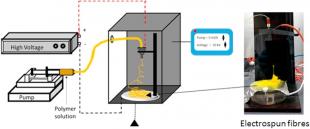Polymers of Intrinsic Microporosity (PIMs) are microporous materials that are characterized by a very large volume of interconnected pores. Since their development in 2005, PIMs have attracted a lot of attention as gas separation membranes, sensors, or highly efficient adsorbents for organic vapors. For example PIM-1 is employed by 3M as a colorimetric sensor in their organic vapour respirator cartridges. A key feature of PIMs is their solution processability that allows to form the materials into thin film for membrane applications or nanofibers for adsorption applications.
PIMs large porosity and their affinity with organic vapours make them interesting candidates for the adsorption and destruction of dangerous molecules; the School of Chemistry at the University of Edinburgh is looking at modifying the chemical structure of PIMs in order to improve the rapid adsorption and destruction of Chemical Warfare Agents (CWAs).
Once a new material is synthesized, the powder needs to be processed into a suitable form in order to maximize the efficiency of the adsorption process, minimizing the amount of polymer needed while maintaining the structural integrity, the large surface area and the mechanical properties required by the application. Nanofibers are of particular interest since they can be used in sensor or be interwoven into protective gear to ensure large surface coverage in the layer and to avoid delamination of thin coated layers.
This project will look at the controlled formation of electrospun nanofibers from novel PIMs materials developed in collaboration with the School of Chemistry.
Further Information:
Closing Date:
Principal Supervisor:
Assistant Supervisor:
Prof Neil McKeown
Eligibility:
Minimum entry qualification - an Honours degree at 2:1 or above (or International equivalent) in a relevant science or engineering discipline, possibly supported by an MSc Degree.
To undertake this research, we are seeking a motivated candidate with an honors degree at 2:1 or above in any of these areas, chemical engineering, chemistry, materials science, physics or a related discipline.
Further information on English language requirements for EU/Overseas applicants.
Funding:
Applications are welcomed from self-funded students, or students who are applying for scholarships from the University of Edinburgh or elsewhere
Competition funding opportunities available – please enquire
Open to students from the UK or EU



